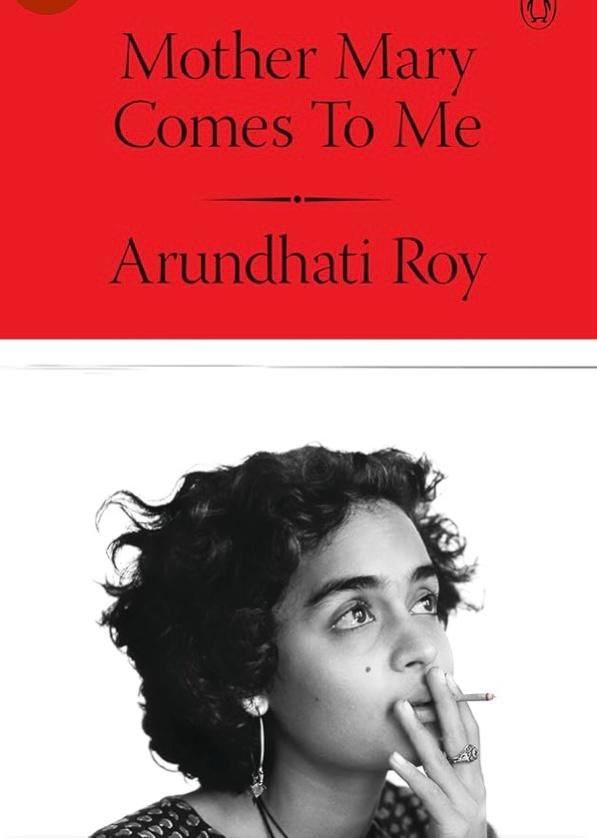
In the autumn of 2025, Arundhati Roy unleashes Mother Mary Comes to Me, a memoir that roils like a Kerala river in flood—fierce, unpredictable, laced with dark wit and unflinching sorrow. Fresh off novels that etched her name in global literary lore, from the Booker-winning The God of Small Things to the sprawling The Ministry of Utmost Happiness, and amid her decades-long skirmishes with power through essays that skewer empires and states, Roy pivots to the intimate. This Kirkus Prize finalist isn’t a polished autobiography but a jagged mosaic: grief-stricken, rebellious, and radiant. At its heart pulses the ghost of Mary Roy, the author’s mother, who died in 2022, leaving her daughter “heart-smashed” and adrift in a torrent of mourning. Roy doesn’t seek solace in tidy narratives; instead, she wields her pen like a blade, carving out a portrait of love as a battlefield—tender and brutal, a force that both shields and shatters.
The Indomitable Matriarch
Mary Roy emerges as a colossus of defiance, a woman who bulldozed through the barriers of her era. Hailing from Kerala’s Syrian Christian enclave, she shattered the chains of a stifling marriage to Micky Roy, a once-promising tea planter reduced to a “Nothing Man” by booze. With toddler Arundhati and her brother Lalith in her wake, Mary bolted, defying a family that disowned her under archaic laws denying daughters inheritance. Stranded in a ramshackle Tamil Nadu cottage facing eviction, she uprooted again to Aymanam, the lush village that would later haunt Roy’s fiction. There, channeling sheer grit, she birthed Corpus Christi School, transforming it into a beacon of progressive education that drew national praise.
Her audacity didn’t stop at pedagogy. In a groundbreaking 1986 Supreme Court showdown, Mary dismantled discriminatory inheritance rules for Syrian Christian women, etching her name into India’s legal annals and empowering generations. This wasn’t mere activism; it was a visceral uprising against patriarchy’s grip. Yet Roy strips away the veneer of heroism, revealing a matriarch whose fire scorched as often as it warmed. Imperious and explosive, Mary’s domestic realm was a minefield of moods—quarrels that left emotional craters, volatility that tested loyalties. She wasn’t a flawless icon but a whirlwind of vitality, her “madness” reframed not as flaw but as fierce resistance to conformity’s chokehold. In Roy’s lens, this enigma becomes a wellspring: a life lived on the edge, where triumph and turmoil danced in lockstep.
Forged in Familial Flames
Roy’s early years unfold as a vivid tapestry of paradox, where affection tangled with antagonism amid Kerala’s verdant chaos. Aymanam wasn’t a serene idyll but a cauldron bubbling with eccentric souls—defeated yet defiant, cosmopolitan in their quirks. Young Arundhati absorbed her mother’s dual essence: protector one breath, provocateur the next. Stability was a myth; instead, Mary instilled a feral resilience, a craving for liberty born from surviving her storms.
The intimacy of these recollections stings with unvarnished truth. Roy evokes the grit of girlhood—the lice painstakingly extracted from her scalp, which she crushed with savage delight. Such vignettes pulse with a child’s raw glee amid hardship, underscoring love’s inseparable shadow: hostility. Dependence fueled defiance; every maternal outburst honed a spirit unbowed. Attempting to decode her mother’s worldview, Roy confesses, twisted her into a labyrinth of empathy and exasperation. Her brother’s rose-tinted recall of being cherished contrasts sharply with her own void, which she deems a fortunate gap—a wound that sparked independence. Through it all, gratitude simmers: Mary’s overbearing nature, far from crushing, ignited an imagination that would blaze across pages.
A Necessary Flight
Adolescence demanded escape. At 18, in the late 1970s, Roy decamped to Delhi’s School of Planning and Architecture, framing the move not as betrayal but as lifeline. Distance preserved devotion, allowing love to endure without suffocation. Delhi unfurled like a new frontier—bohemian, intellectually electric, a haven from Kerala’s gravitational pull. It mirrored India’s own metamorphosis: the fade of post-Independence idealism, icons like Gandhi and Tagore yielding to globalization’s glossy facade and an elite’s growing aloofness.
A poignant interlude captures this pivot: Roy’s reunion with her faded father in a dingy hotel. Prone on the bed, knees crooked, feet whimsically aloft, Micky embodies pathos wrapped in absurdity—a snapshot of fractured bonds, rendered with wry tenderness. This encounter refracts Roy’s inheritance: a household of volatility that, for all its scars, armored her against a world’s deceits.
Echoes of Insurgency
As the memoir expands, personal fissures align with national fractures. Mary’s skirmishes—against kin, creed, and custom—prefigure Roy’s own crusades. From railing against nuclear arms to championing the displaced in the Narmada Valley protests, Roy’s activism isn’t calculated doctrine but gut instinct, a maternal echo. Both women spurn submission, their solitude a badge of unyielding will. The nation, Roy muses, mirrors this fraught tie—bound yet unloving, a entity that demands allegiance without reciprocity.
Prose as Pulsing Paradox
Roy’s craft elevates the tale: a style unbound, blending fiction’s lush rhythms with essayistic edge. Fragmentary and fluid, it defies linearity, mimicking memory’s caprice—plunges into politics, pauses for reflection, spikes of humor amid despair. Sentences slice through pretense, turning bitterness into epiphany, cruelty into catharsis. The Beatles-borrowed title hints at yielding to wisdom’s whisper, yet Roy’s quest is active, a defiant dialogue with the departed.
In this refusal of closure, the memoir transcends genre. It’s no hallowed tribute but a vibrant testament to love’s wild geometry—wounds as gateways to strength, contradictions as cradles of freedom. Roy honours her mother’s seismic imprint without gloss, restoring her as flawed and formidable.
Legacy of Unruly Love
Mother Mary Comes to Me isn’t comfort food for the soul; it’s a jolt, restless and revelatory. For Roy’s admirers, it unveils the forge of her voice; for others, a mirror to maternal mysteries—unpredictable, empowering, eternal. In bridging hearth and history, Roy crafts a universal ode: to the women who mold us in fire, leaving us scarred yet sovereign. This is literature at its most alive—embracing the thorn to claim the bloom.
Hasnain Naqvi is a former member of the history faculty at St. Xavier’s College, Mumbai


